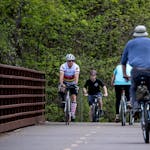Evan Newton loves to be outdoors. He loves to watch the sun rise on crisp Minnesota mornings, hunt in the state's beautiful forests and enjoy picturesque wildlife with his family and friends.
But it isn't always easy. Newton, 58, has spent the past 21 years of his life in a wheelchair, and the past eight in a powered wheelchair, because of a nerve disease, and there are many outdoor areas across the state that aren't accessible for him.
"As a disabled individual, I want to be included in the opportunities to get out and to enjoy," said Newton, of Bloomington, the current treasurer and former president of Capable Partners, an organization that provides outdoor opportunities for individuals with physical disabilities. "I should have those opportunities just as much as anyone else."
The Minnesota Department of Natural Resources is hoping to make that happen.
After the Legislature charged the department in 2019 with researching accessibility, the DNR tasked regional wildlife manager David Trauba to lead a team to investigate how to make the outdoors, and specifically state wildlife management areas (WMA), more accessible and inclusive to people with disabilities.
The pandemic delayed the start of the project, but Trauba's team has filed a report on ways to improve accessibility, which soon will be sent to the legislature.
Among the key takeaways and recommendations, the department is going to approach accessibility in a systematic way.
"We are going to have to take a more enterprise approach on accessibility, where we should have the facilities and what they should look like," Trauba said, adding that the more localized approach the DNR took previously didn't meet all accessibility standards required by law.
Wildlife management areas are state-owned properties that are designated for hunting, fishing, bird-watching and other recreational activities. They are more primitive than state parks, with the only facility for most being a parking lot. There are more than 1.3 million acres stretched over about 1,500 WMAs across the state.
On these wildlife areas, there are 75 facilities dedicated to providing hunting or watching opportunities for people with disabilities, Trauba said.
Hunting blinds account for 64 of those facilities, with the other 11 being wildlife viewing structures. The northern area of the state has fewer facilities than the southern part of the state, with the DNR's northeast and northwest regions accounting for only 14 of the 75 facilities.
The report highlights different areas the department needs to improve, including facilities upgrades and additions, availability of motorized vehicle permits, better external outreach and communications, and additional internal education programs.
Steps for improvement
Dean Petersen worked with Trauba's team as a representative for Capable Partners. Petersen said the DNR has done some great work improving accessibility over the past 10 years and the actions deliberated on by the team are another step in continuing to make the outdoors inclusive for everyone.
"It's a great opportunity for physically challenged individuals in Minnesota," Petersen said. "This will help standardize access throughout the whole state, not just in certain WMAs."
A big step in improving accessibility is upgrading and adding facilities. While the WMAs are low on infrastructure, Trauba said the facilities they do have need to be up to correct standards. He added many of the 75 facilities they have dedicated to people with disabilities are not even 100 % accessible.
Randy Sorensen, the executive director for Options Interstate Resource Center for Independent Living, said people with disabilities understand it is not feasible to have accessible trails throughout all state and federal outdoor areas, nor do they want that. But parking lots, blinds built for hunters with disabilities and other essential buildings have to be compliant with American with Disabilities Act standards.
Newton said when these facilities have barriers to entry for him, he can't help but feel like they are to keep him away.
Christine Reisz, an area wildlife manager who was on Trauba's team, said those basic facilities need to accessible to everyone and that it needs to be on the forefront of everyone's mind when working on them.
"We need to make sure that we're thinking about any possible user and not putting barriers up," Reisz said.
The DNR sent out a survey to the public about accessibility in January, and Trauba said it was crucial to understanding what the people wanted from the DNR. One of the biggest takeaways from the survey, which was filled out by 314 people, was that about 31% of respondents didn't know WMAs had facilities and programs for people with disabilities.
That was shocking to Trauba, and resulted in the team emphasizing the importance of outreach in the report. Trauba said they are going to work on making information easier to access and more clearly displayed on the DNR website. Petersen said this is the No. 1 area of improvement for the department going forward.
Sorensen added that he hopes the information is not only disseminated externally, but to people within DNR and people looking to enter the wildlife field, too.
Sorensen said he'd like information given to students on accessibility regulations and how to make wildlife-area programs and architecture accessible.
That is a goal of the DNR, too. There has been little accessibility training before, and it was almost always for people in upper management. Trauba hopes the internal training for employees at all levels across the state can begin this summer.
One thing that is not included in the report: specific calls for funding facilities upgrades. Trauba said before he will request funds from the legislature, he wants to send engineers to specific WMAs to determine possible upgrades and their costs.
"It clearly takes money and takes time, but we need to do as much as we can do as soon as we can," said Margot Cross, who represented the Minnesota Council on Disability on the team. "I think that with this report and the legislature on board — hopefully — we can make things happen."
Peter Warren • 612-673-1713






